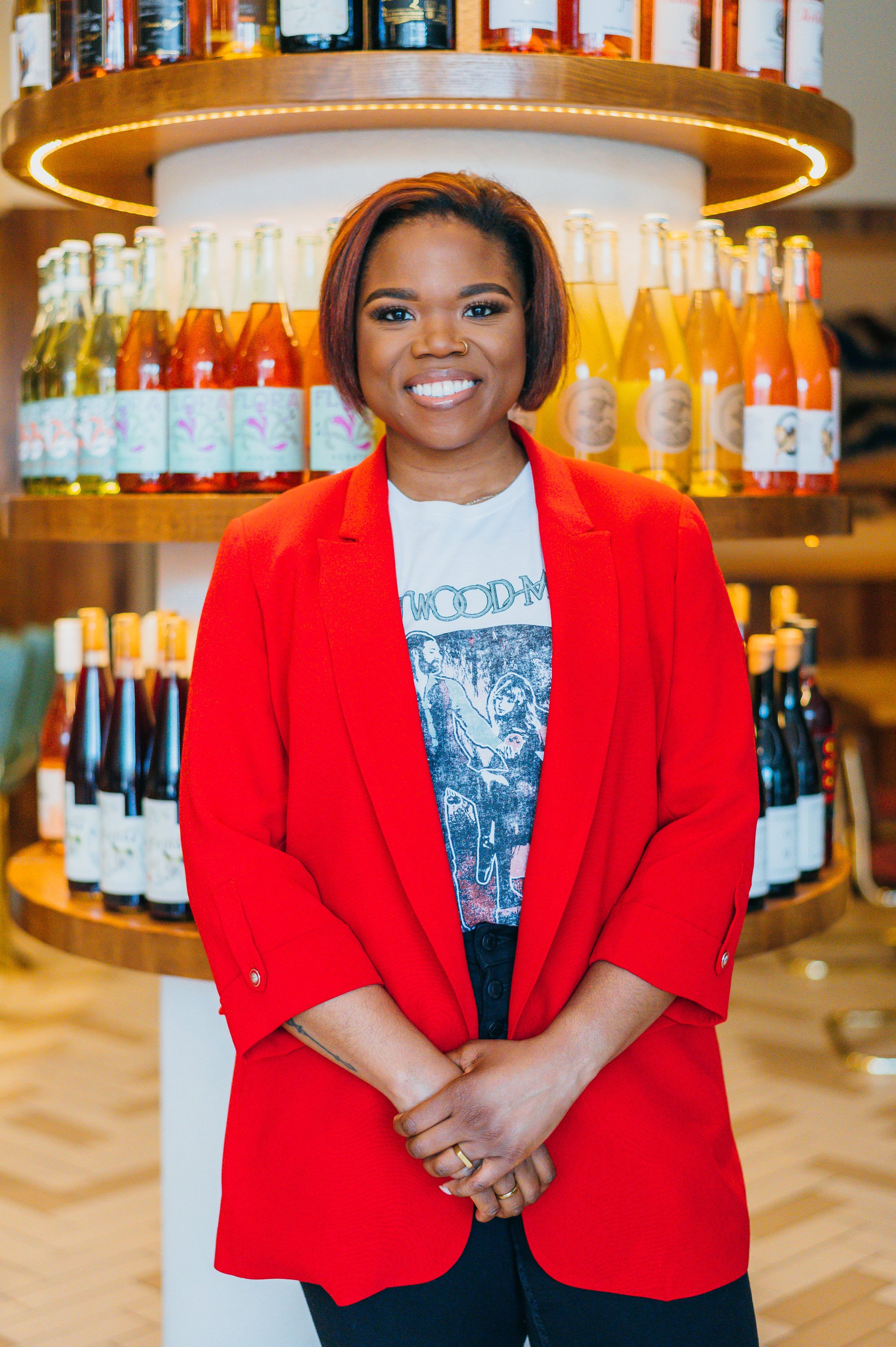In Black Culture, Wine Has Always Been A Strong Supporting Character
Television shows like ‘Grand Crew’ and ‘Kings of Napa’ prove we’ve always been about this wine life
Growing up, like many Black people, wine wasn’t a staple on the dinner table in my household. It wasn’t until I traveled to Spain for a study abroad trip that I experience wine first hand – from seeing the grapes on the vine to touching the barrels in the cellar to tasting the wine right out of the bottle. This month alone, three television shows have premiered on network television: Grand Crew (NBC), The Kings of Napa (OWN), and Promised Land (ABC), each of them spotlighting Black and brown people interacting with wine regularly. But this isn’t the first time that wine has been a supporting character in Black culture. For decades, wine has been referenced in Black music, literature, and television not only as a symbol of celebration and enjoyment but one that demonstrates our knowledge of a beverage that often represents whiteness, wealth, and accessibility.
In a 2019 article for VinePair, author and journalist Nneka Okona explored why the wine industry had long ignored the Black consumer. “Why would the wine industry want to leave what a 2018 Nielsen report asserts is the $1.2 trillion buying power of black American consumers on the table?” she asked. She pointed out that Moscato had a huge moment due to the fact that it was often mentioned in hip-hop songs (see: “No Hands” by Waka Flacka), and was a wine that many Black people did (and still do) enjoy. “Marketing to black wine drinkers could work, all of these instances prove,” Okona wrote. “But in order to do so, wine industry gatekeepers and the agencies that create ads that appear in magazines, newspapers, and on television need to widen their vision.”
Dr. Stephanie Y. Evans is a professor of Black Women’s Studies at Georgia State University, and she is currently working on a book entitled, “Mother Vines: A History of Black Women and Wine.” Without even going in too deep, Dr. Evans provides a number of pop culture examples–from Tori Morrison’s iconic novel Songs of Solomon to Gabrielle Union’s memoir We’re Going To Need More Wine–that indicate how wine has made an impression on our lives. To further support her book, Dr. Evans has a monthly Works-In-Progress Lecture Series that will dissect her research and how Black women have always had a place within the wine narrative. I, for one, am extremely excited to learn from Dr. Evans and for the world to know that wine has a place in our everyday lives.
REPRESENTATION MATTERS
In the 1980s drama Dynasty, Dominique Deveraux, played by the late Diahann Carrol, was a woman of poise, style, and class. Her nemesis, Alexis Carrington Colby (played by Joan Collins), had heard a lot about Deveraux but never had the pleasure of meeting her…until she pulled up to her home.
This iconic scene not only is one of the shadiest in television history, but it introduced me to a wine term that I had no idea could be used to describe Champagne:
There would be several references to this scene in pop culture for years to come, but what has always stuck with me is Devareaux’s unwavering stance on the terrible glass of bubbly. And then she goes on to shade Colby’s choice of caviar – AN ICON!
For me, Scandal was the spark to ignite the flame in my love affair with wine. In April 2012, I was living in Washington, D.C. and like many people, became enamored with how Shonda Rhimes created a character like Olivia Pope (based on real-life political crisis expert Judy Smith) that was not only multidimensional and brilliant but enjoyed luxurious things unapologetically – like cashmere sweaters, sturdy leather handbags and of course, good wine. At 23 years old, I wasn’t making “gladiator in a suit” money by any means, but Olivia’s love for fine wine resonated with me and made me feel like I too could appreciate a good glass of fermented grape juice. From the glassware she used (those infamous Crate & Barrel glasses) to the way the (fictional) 1994 Grand Vin DuBellay rolled off her tongue effortlessly, I was encouraged to explore and enjoy wine unapologetically.
Desiree Harrison-Brown is a Los Angeles-based wine educator and influencer who was inspired to work in the wine industry because of her love for exploring the world, and wine allows her to do just that. “There weren't many shows that featured people that looked like me drinking wine let alone pursuing a career in it,” she says. “I am so happy to see that changing with shows like Grand Crew, Kings of Napa, movies like Uncorked and even seeing the characters enjoying wine in the show Insecure.”
Seeing barbeque paired with a complex Barolo or Prosecco topped with Jameson are both positive examples that make wine less intimidating and more relatable to our every day experience.
PHOTO: COURTESY OF OWN
“THIS IS FAMILY BUSINESS”
During the 1960s and 1970s, Black families were often portrayed in mainstream television (think of shows like Good Times, Sanford & Son) as struggling or constantly in survival mode. It wasn’t until The Jeffersons showed us that we can move on up to a deluxe apartment in the sky that Black people could see examples of themselves as living comfortably and taking up space in their own unique way. From there, we would be introduced to The Huxtables (The Cosby Show), The Winslows (Family Matters), The Banks (The Fresh Prince of Bel-Air) The Kyles (My Wife & Kids), The Johnsons (black-ish), and so many other Black familial units that are affluent, but still deal with real problems.
The Kings of Napa allows for wine to not only serve as a supporting character but to demonstrate how important it is to establish and cultivate a legacy. Yes, the show has its twists, turns, and outrageous drama, but to see a Black family in Napa Valley owning and operating their own vineyard, producing award-winning wine, and engaging with wine regularly is an image that is necessary for mainstream television. In a way, the show can also be interpreted as art imitating life. The only Black-owned vineyard in Napa Valley? Brown Estate. The largest Black-owned wine company in the United States? The McBride Sisters. These brands are just two of the many shining examples of Black excellence (a term often said in TKON) within the wine industry.
During a virtual preview party for The Kings of Napa, show creator Janine Sherman Barrois expressed that she was inspired by a visit to Rideau Vineyards (which was owned by Iris Rideau, the first Black woman to own a winery in the United States) and always wanted to create a show about a Black family that is grounded, real, and rooted in excellence. The last time there was a show about a family who owned a vineyard was Falcon Crest (1981). “So often, we see Black people in trauma,” Barrois said. “Kings of Napa shows Black people in our humanity–living, breathing, being adults–with the ability to take a wine business worldwide. ” As the show moves toward its fourth episode next week, we’re finding blood might be thicker than water, but definitely not more potent than wine.
Bottom line, we can still be faced with difficulties, but we can laugh and be joyful and express love too. We can be smart and talented and not always “the first” to do something.
A PLACE TO CALL OUR OWN
Grand Crew has been totted as “this generation’s version of Friends,” and while I would respectfully disagree, this new sitcom does give Black millennials an opportunity to be seen taking up space in a place like a wine bar. It’s no secret that many people find wine to be intimidating and overwhelming. With all of the grape varieties, regions, and terminology, it’s a challenging topic to master.
PHOTO: COURTESY OF NBC
Grand Crew, in my opinion, makes enjoying wine an approachable, attainable experience. Shows like Friends, New Girl, and of course, the O.G. Cheers, established a sense of normalcy for their (white) characters, and gave them places to gather, gripe, giggle and goof off. While shows like Living Single, Martin, Malcolm & Eddie, and even Girlfriends demonstrated Black people gathering in bars and coffee shops, they never show us engage with a specific beverage.
Slowly but surely, brands and major companies are starting to catch on that Black consumers don’t just enjoy drinking with friends, but they appreciate the craftsmanship behind a bottle of wine and desire to learn more about it. Even further, there are more Black-owned wine bars and wineries popping up nationwide that give us an opportunity to support Black business.
“I have slowly seen a change in marketing, but I think the missing piece of the puzzle is just showing Black people drinking and enjoying wine in a way that reflects how it is truly a part of our lifestyle and the Black experience,” Harrison-Brown says. “It's important for more shows to show Black people as consumers and owners because it is a reflection of real life. Moreover, it encourages and shows people that may be intimidated to explore wine or start a wine business by wine that it is in fact for them as well.”
At the end of Grand Crew’s pilot episode, Sherm (played by Carl Tart) rattles off an impressive tasting note of cabernet franc. “What? Maybe I read a couple of books on wine. And LeBron drinks it, so wine is Black now,” he says. This moment, as funny as it is, illustrates that Black people not only consume wine for fun, but we have been and continue to be contributors, trailblazers, and change-makers within the industry.
Who might those contributors, trailblazers, and change-makers be, you may ask? The list continues to grow (which is AMAZING), but a few you should keep your eye on and support: Tiquette Bramlett, president of Vidon Vineyards in Oregon; Tahiirah Habibi, sommelier, founder of The Hue Society and co-founder of The Root Fund; George W.C. Walker, National Brand Ambassador/Winery Operations Assistant at Wade Cellars; social media influencer Isis Daniel; my mentor, writer and founder of Black Wine Professionals Julia Coney; winery relations and vineyard operations manager at Monte Rosso Vineyards Brenae Royal; owner of Ole’ Orleans Wines Kim Lewis; sommelier and founder of 59 Wines Devin Reed and so many others. These Black wine professionals are proof that you can have a career obsessing over fermented grape juice, and that our stories deserve to be told. Furthermore, television shows like Grand Crew and The Kings of Napa showcase our humanity. They establish normalcy and demonstrate that Black people are layered, multifaceted, and complex – just like a beautiful glass of wine.
“I would love to see more shows featuring Black people in the multitude of wine career options like writers, vineyard managers, hospitality, wine shop owners in addition to the more "glamorized" professions like owning a winery or vineyard,” says Harrison-Brown. “I think we are moving in the right direction of diversifying the industry and it's important to have shows reflect that as well as showing what is possible.”






